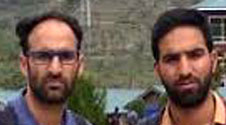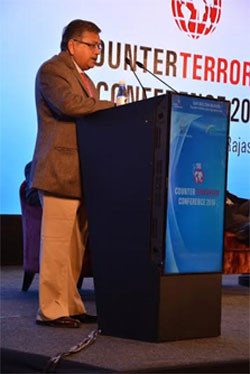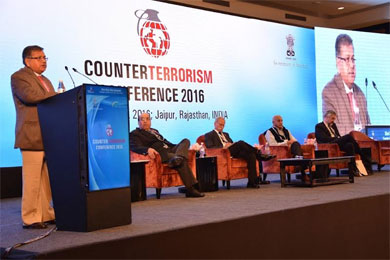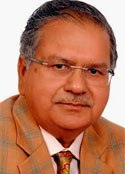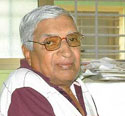By Sultan
Shahin, Founding Editor, New Age Islam
14 September 2018
Oral Statement, 39th regular session of UN Human
Rights Council, Geneva (10-28 September 2018)
General Debate, Item 3, Promotion and Protection of
All Human Rights, Civil, Political, Economic, Social and Cultural Rights,
Including the Right to Development
Delivered by Sultan Shahin, Founding Editor New
Age Islam,
On behalf of Asian-Eurasian Human Rights Forum
Mr. President,
A War on Terror has been raging for 17
years now but we are no closer to defeating Islamist terror. Jihadism continues
to attract Muslim youth. This is because the world has not paid enough
attention to the ideology of Islamism and Jihadism.
Mainstream Muslims have considered Islam a
spiritual path to salvation, one of the many. Islam aims at reforming society
for a peaceful, harmonious, pluralist existence. However, due to certain
historical factors, the theology and jurisprudence of Islam that evolved in the
8th and 9th centuries (CE), present Islam as a political, totalitarian ideology
of supremacism, xenophobia, intolerance and gender discrimination. It is this
theology of violence, exclusivism and world-domination that is taught in
madrasas and sustains Islamism. But despite the Islamist violence against
peaceful Muslims and non-Muslims alike, the community is still not focussed on
the need for evolving a counternarrative of Islam.
It is imperative that Muslim countries that
have signed the UN Charter look into the issue urgently and work towards
developing a new theology of peace, pluralism and gender justice. While several
countries like Morocco and now Saudi Arabia appear to be moving in this
direction, the one country that has made a solid contribution is Turkey. In a
decade-long exercise 100 Turkish scholars have managed to limit the number of
authentic ahadith to just 1600, out of over 10,000, and provide each hadith
with context and suitable interpretation. This book of authentic Hadith has been
provided to all mosques in Turkey but I hope it is made available to the global
Muslim community in their own languages as soon as possible.
The
present theology is simply not compatible with the requirements of living in
complex, plural societies of the 21st century. Allama Iqbal, a poet-philosopher
of the South Asian sub-continent had called for the reconstruction of religious
thought in Islam almost a hundred years ago. Let us at least start working on
it now.
But first, it’s
important for us to understand what has led to the present state of affairs.
Why have the Muslims ulema (religious scholars) become so tolerant, if not
actually supportive, of the militant Jihadis in our midst, despite the
horrendous toll, in which tens of thousands of Muslims have themselves been
killed, not to speak of events like 9/11, and repeated terrorist violence in a
number of cities in Europe and North America.
The so-called Islamic
state which is known for broadcasting its brutalities in chilling detail has
been ousted from its control of territories in Iraq and Syria, but its ideology
appears to be gaining ground in Africa and South Asia. Al-Qaeda may be down but
is not out; it continues to exert ideological influence on sections of Muslim
youth. The Taliban which harboured al-Qaeda in Afghanistan are resurgent and
the world community appears to be gradually coming round to the view that they
should be allowed to share power in the Kabul administration from which they
were ousted soon after 9/11 in 2001.
Islamist terrorist
organisations like Lashkar-e-Tayyaba and Jaish-e-Mohammad in Pakistan, Boko
Haram and Al-Shabab in Africa and Jemaah Islamiyah in Indonesia, indeed all
across the world, are continuing to gain strength.
Mr. President,
While the world
community may have gotten involved in issues related to Islamist extremism
since 9/11, this is essentially a war of ideas within Islam which has been
going on for centuries. Both God and His Prophet wanted Muslims to be a
moderate, justly balanced community. An ummat-e-wasta, Holy Quran 2:143,
said. Numerous verses in the Quran and narrations of Hadith, exhorted
Muslims never to take to extremes, not even in matters of fulfilling religious
obligations like prayers and fasting. The Prophet actually expressed his anger
specifically against a group of people who wanted to pray all day and night,
fast continuously for weeks, abstain from marriage, give up eating meat in
order to control their lust and to renounce sleeping in beds, etc.
And yet, not long
after the demise of the Prophet in 632 (CE), extremists started emerging and
taking it upon themselves to decide who is a Muslim and who a Murtad
(apostate), Mushrik (polytheist) or kafir (infidel) and also taking it upon
themselves to punish and kill people for perceived apostasy or blasphemy. The
first group to do so were called the Khwarij (the excluded). They killed
thousands of Muslims including Hazrat Ali (RA), the fourth rightly guided
caliph. Today our religious books, belonging to all sects in Islam, give scores
of grounds on which a Muslim can be declared an apostate (Murtad), Mushrik
(polytheist), or infidel (Kafir) and punished with death.
These theological
views empower even individual Muslims to start delivering justice to Muslims
who, they think, have committed acts of apostasy or blasphemy. The divine
justice that was to be delivered by God on the Day of Judgement is dispensed
here by individuals who have been brainwashed with extreme ideas of the scope
and authority of divine commands like Amr bil Maroof wa Nahi 'anil Munkar (Enjoining
good and forbidding wrong).
Quran, Hadith, and
classical Fiqh (jurisprudence) all agree that while there is no concept of an
Islamic state in Islam, only the rulers of a legitimate Muslim state can take
decisions for perpetrating any kind of violence, either in a war against
another state or against individuals in order to impart justice. In classical
fiqh (jurisprudence) no individual or group is empowered to take any violent
action on its own. But today, violence in various forms is tolerated by the
community in the name of Islam. A terrorist has only to quote something from
scriptures in justification, without even a reference to context, and his vile
acts are forgiven. After all, Osama bin Laden never faced a fatwa of apostasy or
blasphemy, while religious reformers like the famous educationist Sir Syed
Ahmad (1817—1898) of India were issued scores of fatwas of apostasy by Indian
Deobandi ulema as well as the Mutawalli of Khana Ka’aba in Makkah. Indeed,
dissenters and reformers in various parts of the Muslim world continue to be
killed by individuals and groups. So-called Islamic State chief Khalifa
Baghdadi’s statement that “Islam was never a religion of peace, not even for a
day,” was greeted with complete and resounding silence from Muslim ulema around
the world.
Mr. President,
This apathy to
growing Islamist extremism is so great that even some highly educated Muslims
ask: “What if 30,000 Muslims from 86 countries joined the Islamic State in just
one year? What is their percentage in a community of 1.7 billion people? How
can you cite this miniscule percentage as evidence of growing extremism?” One doesn’t know how to respond to such
“intellectuals.” The fact is that even if one Muslim thinks that going to a
mosque in the form of a human bomb and blowing oneself up to kill fellow
Muslims during prayers will bring one divine reward, the community should have
been wondering what is it in our religion that lends itself to such dastardly
crimes in the hope for reaching Heaven. Radicalisation has grown exponentially,
but even after thousands of terrorist crimes having been perpetrated, one or
two being reported practically everyday from some part of the world, we remain
unconcerned.
Indeed, the man who
killed Governor Salman Taseer of Pakistani state of Punjab for showing kindness
to a Christian lady accused of blasphemy, is glorified as a saint. After his
judicial execution, the Sufism-oriented Barailvis of Pakistan have built a
shrine in his name and hundreds of thousands visit it, seeking this vile
murderer’s intercession with God for ending their woes in this life and beyond.
What is the source of
this glorification of crimes committed in the name of religion? What lies
behind this indifference, this unthinking, unquestioning acceptance of any
crime that is perpetrated in the name of Islam? It seems Muslims actually
stopped thinking and questioning with the defeat of Mutazillah, the
rationalists, in the middle of ninth century (CE), i.e., a little over two
centuries after the demise of Prophet Mohammad (peace be upon him). They were
told by the ulema to close the doors of Ijtihad, the Islamic principle of
creative rethinking and they did. Ijtihad had been used from the time of Hazrat
Umar (RA) the second rightly guided caliph who assumed office merely two years
after the death of the Prophet (peace be upon him).
Mr. President,
Even after the
closure of doors, ijtihad has continued to be used by individuals but without
sanction from the larger community. It’s only when ulema themselves accept some
innovation that it becomes acceptable to the community. Take for instance, the
use of photos for a passport to go to Hajj, loud speakers or radio to recite
Quran or that of internet for purposes of Dawah (inviting others to the
religion of Islam). These have become acceptable to our religious divines after
long debates. So, it would appear some measure of rationality does dawn upon
our ulema after long, excruciating debates. It seems the time it takes for
their minds to get illuminated is also getting shorter. It took ulema of
Khilafat-e-Osmania (Ottoman Caliphate) almost four centuries to give religious
sanction to the import of printing presses from Europe, but only a few decades
to accept passport-size photographs, loud speakers, radio, television and
internet.
It is not difficult
to see why the world of Islam is mired in deep darkness of ignorance while the
world is making progress by leaps and bounds. Syrian poet Ali Ahmad Said Adonis
(b. 1930) called it “a phase of extinction, in the sense that we have no
creative presence in the world.” Tunisian thinker Abdelwahab Meddeb (1946 –2014)
prophesied “Arab (civilisation), constrained by the framework of Islamic faith,
will join the great dead civilisations.” What constraints of Islamic faith is
Meddeb talking about? Can you imagine Khilafat-e-Osmania (1517–1924),
the rulers of one-third of humanity for centuries, not importing a printing
press, not even to propagate holy scriptures, because religious scholars
thought all new inventions were works of the Shaitan (Satan). Probably, our
religious scholars thought that God had lost His creativity after revealing the
religion of Islam and now only Devil could invent new things. In fact, in the
view of our ulema even Quran is not created by God but is uncreated and
co-eternal with Him, lying in the divine vaults for aeons; He merely revealed a
pre-existing Quran to humanity through Prophet Mohammad in the seventh century
(C. E).
It was largely on the
question of createdness or uncreatedness of Quran (khalq al-Quran) that
a major conflict took place among the ulema of 8th and 9th centuries
(CE), leading to the defeat of rationalist theologians. The rationalists
(Motazallah) said that Quran was created by God in a particular time in
history; it was a compilation of verses that came from time to time to guide
the Prophet and Muslims in the evolving situation in early seventh century
Arabia following the appointment of the Prophet as a messenger of God. So, many
verses are contextual in nature and cannot be applied to other contexts. But
the orthodox literalist ulema would not accept this. They said that Quran was
unique like God and co-eternal with Him; God merely revealed the Quran and did
not create its verses as the unfolding events demanded, the implication being
that all verses are of eternal applicability.
Even Imam Abul Hasan
al-Ash’ari, a Motazallah rationalist till the age of 40, joined the orthodox
camp, though continued to use Motazallah methodology of logical arguments to
support his case. But logic and reasoning were not allowed in the literalist
Hanbali creed even to support their own cause. So bitter opponents of
Motazallah, the Hanbalis and Ash’aris also went their own separate ways.
The uncreatedness of
Quran meant that all the events that led to revelations in the Quran guiding
the Prophet and his companions through the struggle and strife of the early
seventh century Arabia were pre-ordained and choreographed to create
opportunities for Quran’s verses to be revealed. It also meant that all those
who supported the Prophet were simply meant to do so and all those who opposed
the Prophet tooth and nail, including making attempts at his life, were just
doing God’s bidding. How else could a pre-existing Quran be revealed?
This understanding of
Islam also means that everything happening in the world, good or bad, is
pre-ordained. Where is the question of reward and punishment then, the
rationalist (Motazallah) ulema asked? How can God be considered Just, Kind and
Merciful, if He punishes people for doing things he Himself chose for them to
do? All those opposed to the use of reasoning in matters of religion, the
Hanbalies, Ash'aris, Maturidis, Zahiries, Mujassimites and Muhaddithin,
said God is all-powerful; He simply does things that he wills to do. In their
view, imposing canons of justice and morality on God would amount to limiting
his power and this cannot be done. God is not rational or just; He is the
embodiment of power and will, he does what He pleases. God is the First Cause
in a universe which does not have any secondary causes. No cause and effect for
the orthodox ulema, only God’s will and power to do as He pleases.
In the raging
theological debates in the 8th and 9th centuries (CE), both groups cited verses
of Quran. The group opposed to reason also quoted numerous ahadith (believed to
be sayings of the Prophet, even though collected up to three centuries after
his demise). [Some verses of Quran used in this debate can be seen below in an
annex attached to this oral statement.]
A century and a half after the
rationalist group had been defeated and their books burnt, Imam Ghazali (1058 –1111) summed up the Islamic theology of consensus
(Hanbali, Ashari, Maturidi, etc. minus Motazallah) in this way. He put the
following words in the mouth of God:
“These to Bliss, and I care not; And these to the
Fire, and I care not.”
It’s this supposed indifference
and arbitrariness of God that Ibn-e-Rushd (1126 –1198), known as Averroes in
Europe, countered in his famous book “Incoherence of the Incoherence.” This was
a point-by-point refutation of Imam Ghazali’s book “Incoherence of the
Philosophers.” But all of Ibn-e-Rushd’s books were burnt down in supposedly
liberal Muslim Spain (1195) and he had to go into exile. Some of his books
survived only because they had already been translated in European languages
and gained a lot of supporters, even though his ideas were condemned by the
Catholic Church in 1270 and 1277. What gained him most following in
Christian Europe, despite opposition from Church, was his ‘unity of the
intellect’ thesis, claiming that all humans share the same intellect. As a
result, Europe got its renaissance and Muslim world pushed itself into a
darkness from which it is still to emerge.
Mr. President,
Under this literalist
theology, violence, xenophobia, intolerance and gender injustice become
acceptable due to an interpretation of Quran and Hadith which deliberately
avoided using reason and logic. Early 20th century radical ideologues like
Hassan al-Banna, Syed Qutb, Syed Abul Ala Maududi and numerous later ideologues
of Al-Qaeda, ISIS, etc have gone further than the classical jurists and come up
with interpretations that even justify horrors of terrorism in the name of
Muslims’ religious duty to make Islam victorious in the world. In many mosques
even in the non-Muslim majority West today prayer-leaders curse non-Muslims and
pray for their defeat and victory for Islam in their Friday sermons. The
seventh-century war-time Arabian mindset persists.
In classical jurisprudence Jihad or Qital
ordered by the state was considered farz-e-kefaya, a communal duty which
some people in the community would perform voluntarily absolving others of this
duty. To defend one’s country in the event of an external attack was considered
farz-e-ain, every capable individual Muslim’s religious duty. But even
this was subject to the guidance and instructions and requirements of the
State. But modern ideologues have made
even offensive Jihad (in other words terrorism) a farz-e-ain for all
individual Muslims, and even done away with the need for a legitimate Muslim
state to order such fighting.
Islamic scriptures
and books of fiqh (jurisprudence) and aqaid (beliefs), can always
be made to yield some sort of support for almost any position, even positions
that are diametrically opposed to each other, as we have seen above in the
debate between Motazallah and the Hanbalis and Ash’aris. And these become
acceptable to a populace that has been told for a millennium that merely thinking
a thought is unbelief or infidelity (al-fikr kufr).
We have seen in the
above quotations from Quran cited by the Motazallah that God asks Muslims again
and again to think, observe, learn and so on. Occasionally, He gets angry and
asks Muslims, why won’t you think? See, for instance, the following verse from
Quran: "Truly, the worst of all creatures in the sight of Allah are the
deaf, the dumb, those who do not use their reason/think." Qur'an 8:22
And here we are, a community
that has accepted for a millennium that merely thinking a thought amounts to
denying God’s divinity. We are where we are today largely because we have
accepted our dominant theology of al-fikr kufr, leading to violence and
exclusivism. Blind, unthinking adherence to the dogma (taqlid) has been
our practice since the 9th century. Even the Salafi/Wahhabi who call themselves
ghair muqallid (those who do not follow any school of thought) actually
follow equally blindly the Hanbali jurisprudence and Ibn-e-Taimiya and Mohammad
Abdul Wahhab’s theology.
Mr. President, I hope
Muslims states that are signatories to the UN Charter take the issue of
terrorism seriously, understand its link with our current taqlidi theology
of consensus, make serious efforts to evolve a new ijtihadi theology of
peace, pluralism and gender justice, and revise our madrasa text books
accordingly. The new theology should be more rational, coherent and internally
consistent, over which a consensus of the global Muslim community can be
gradually evolved.
Thank you, Mr.
President.
----
Annex 1
Motazallah
view of God’s rationality and justice and encouragement to reasoning emanate
from the following and similar verses in the Holy Quran:
Surely the worst of beasts in God's sight are those
that are deaf and dumb and do not reason. (8:22)
Qur'an explains its verses to a
“tribe, nation or community (qawm) who thinks" and chastises "those who do not use
their reason" (see
for instance, al-Baqara 2:164; al-Ma'idah 5:58; al-Ra'd 13:4; al-Nahl 16:12;
Maryam 19: 93-95.
And He lays abomination upon those who do not reason. (10:100)
(2:164) (To guide) those who
use their reason (to this Truth) there are many Signs in the structure of
the heavens and the earth, in the constant alternation of night and day, in the
vessels which speed across the sea carrying goods that are of profit to people,
in the water which Allah sends down from the sky and thereby quickens the earth
after it was dead, and disperse over it all manner of animals, and in the changing
courses of the winds and the clouds pressed into service between heaven and
earth.162
“A book We have sent down to thee, blessed,
that men possessed of
mind
may ponder its signs and so remember.” (38:29)
“That thou mayest bring forth your people from the darkness into the light ... “(14:5)
Justice:
“And We sent down with them the Book and the Balance
so that men might uphold
justice
... “(57:25)
“We have not sent thee, save as a mercy unto all beings. “(21:107)
“A Book We have sent down to thee that thou mayest
bring forth mankind
from the darkness into the light... “(14:1)
It is incumbent upon
Allah to show you the right way. (16:9)
---
Annex 2
Hanbali-Ashari-Maturidi
view of God as omnipotent, whimsical, arbitrary, wilful, despotic, not limited
by canons of justice and rationality emanate from
the following and similar verses of the Holy Quran (as well as many Ahadith,
specially mutawatir ahadith, considered totally authentic and akin to
revelation by most Muslims). I am not quoting Hadith here but apart from
Quran, it was a large number of Hadith narrations that solidified their view:
“Allah does
what he wills.” (14:27)
(Allah is) the
Doer of what He wills.7 (85:16)
“He forgiveth
whom He pleaseth, He punishes whom He pleaseth.” (2: 284)
“He forgives
whom He wills, and He punishes whom He wills. And to Allah
belongs the dominions of the heavens and the earth and whatever is in
between them and to Him is the final destination,” (5: 18)
“He punishes
whom He wills and forgives whom He wills, and Allah is over all things
competent.” (5: 40)
---
“In their hearts is a sickness, and God has increased that sickness ...” (2:10)
“God has set a seal on their hearts and on their hearing, and on their
eyes is a covering ... “(2:7)
“We lay veils upon their hearts lest they understand it ...”. (6:25)
“So, does God seal the hearts of the unbelievers.” (7:101)
“God is the Protector of the believers; He brings
them forth from the darkness into the light. And the unbelievers --their protectors are taghut (satanic forces), that bring them forth from the light into the darkness ...” (2:257)
---
“So, whosoever Allah wants to Guide, He expands his breast to
Islam and whoever He wants to misguide, He makes his breast tight and
constricted as though he were climbing into the sky.” (Quran 6: 125).
Also, “If Allah so willed, he could make you all one people. But he
leaves straying whom He pleases, and He guides whom He pleases and
you shall certainly be called to account for all your actions.” Quran
(16: 93).
New Age Islam, Islam Online, Islamic Website, African
Muslim News, Arab
World News, South
Asia News, Indian
Muslim News, World
Muslim News, Women in Islam, Islamic
Feminism, Arab Women, Women
In Arab, Islamophobia in America, Muslim
Women in West, Islam Women and Feminism
